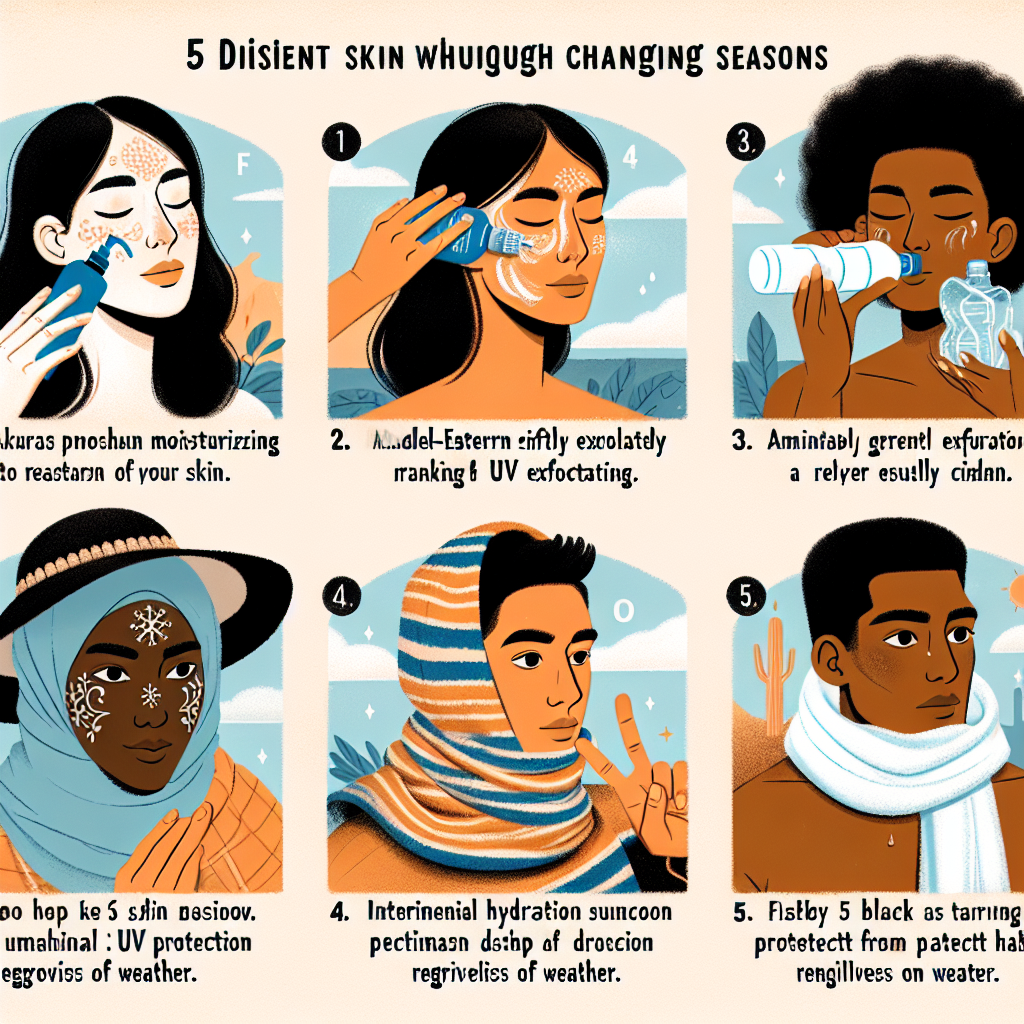Maintaining healthy skin can be a challenge, especially as the seasons change. Different seasons bring with them changes in the environment, such as temperature, humidity levels, and the amount of sunlight. These factors can impact the health of our skin and may require adjustments to our skincare routine. In this article, we will discuss 5 expert tips on maintaining healthy skin despite seasonal changes.
1. Stay Hydrated
One of the most important factors in maintaining healthy skin is staying hydrated. During the winter months, the air tends to be drier, which can lead to dehydration. Dehydrated skin can appear dull, dry, and flaky, and may be more prone to fine lines and wrinkles.
To combat dehydration, it is important to drink plenty of water throughout the day. The general recommendation is to drink at least 8 glasses of water per day, but this may vary depending on your age, weight, and activity level. Additionally, using a humidifier in your home can help to add moisture to the air and prevent your skin from becoming too dry.
In the summer months, it is important to stay hydrated as well, as the heat and sun exposure can lead to increased water loss through sweat. Drinking water and eating water-rich foods, such as fruits and vegetables, can help to keep your skin hydrated and healthy.
2. Adjust Your Skincare Routine
As the seasons change, it may be necessary to adjust your skincare routine to address the specific needs of your skin. In the winter, you may need to use a heavier moisturizer to combat dryness, while in the summer, a lighter moisturizer may be more appropriate to prevent your skin from feeling greasy.
In addition to moisturizing, it is important to exfoliate regularly to remove dead skin cells and promote cell turnover. In the winter, you may want to use a gentle exfoliant, such as a scrub or a chemical exfoliant, to prevent your skin from becoming too dry. In the summer, a more intense exfoliant, such as a peel or a mask, may be necessary to combat the build-up of sweat and oil.
It is also important to protect your skin from the sun year-round by using a sunscreen with at least SPF 30. Sunscreen helps to prevent sun damage, which can lead to premature aging, dark spots, and even skin cancer. Additionally, wearing a hat and protective clothing can help to shield your skin from harmful UV rays.
3. Eat a Healthy Diet
A healthy diet is essential for maintaining healthy skin, no matter the season. Eating a diet rich in fruits, vegetables, whole grains, and lean proteins provides your skin with the nutrients it needs to stay healthy and vibrant. In particular, foods high in antioxidants, such as berries, leafy greens, and nuts, can help to protect your skin from damage caused by environmental factors, such as pollution and UV rays.
In the winter months, it may be tempting to indulge in comfort foods, such as sugary treats and heavy meals. However, these foods can lead to inflammation in the body, which can exacerbate skin conditions, such as acne and eczema. Instead, try to focus on eating foods that are high in omega-3 fatty acids, such as salmon, walnuts, and flaxseeds, which can help to reduce inflammation and promote healthy skin.
In the summer, it is important to stay hydrated by eating water-rich foods, such as cucumbers, watermelon, and tomatoes. These foods not only provide hydration but also antioxidants, vitamins, and minerals that promote healthy skin. Additionally, foods high in lycopene, such as tomatoes and watermelon, can help to protect your skin from sun damage.
4. Protect Your Skin from the Elements
The elements can take a toll on your skin, no matter the season. In the winter, cold temperatures and dry air can strip your skin of its natural oils and lead to irritation and dryness. To protect your skin, it is important to wear gloves, scarves, and hats when you are outside, and to use a moisturizer with ingredients like hyaluronic acid and ceramides to hydrate and repair your skin.
In the summer, the sun and heat can cause sunburn, premature aging, and skin cancer. To protect your skin, it is important to wear sunscreen with at least SPF 30, seek shade during peak hours, and wear clothing that covers your skin. Additionally, sunglasses can protect your eyes and prevent squinting, which can lead to fine lines and wrinkles around the eyes.
It is also important to protect your skin from other environmental factors, such as pollution and allergens, which can exacerbate skin conditions, such as acne and eczema. Using a gentle cleanser and moisturizer, as well as avoiding harsh chemicals and fragrances, can help to reduce irritation and keep your skin healthy.
5. Practice Stress Management
Stress can have a negative impact on your skin, leading to breakouts, dryness, and premature aging. As the seasons change, it is important to practice stress management techniques, such as deep breathing, meditation, yoga, and exercise, to reduce stress and promote healthy skin.
In the winter months, stress can be heightened by the holidays, cold weather, and lack of sunlight. To combat stress, try to maintain a regular routine, get plenty of rest, and spend time with loved ones. Additionally, taking time for self-care, such as a hot bath, a massage, or a facial, can help to relax your mind and body.
In the summer, stress may be caused by increased social activities, travel, and changes in routine. To manage stress, try to prioritize your commitments, get plenty of exercise and rest, and take breaks when needed. Additionally, spending time outdoors in nature, such as going for a hike or a swim, can help to reduce stress and promote relaxation.
In conclusion, maintaining healthy skin despite seasonal changes requires a combination of hydration, skincare, diet, protection, and stress management. By following these expert tips, you can keep your skin healthy and glowing all year round.








Leave a Comment